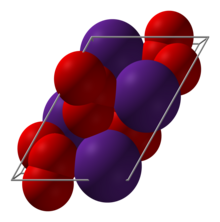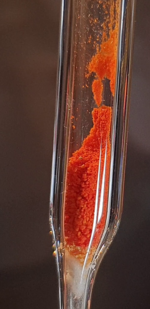Caesium ozonide
 Caesium cations, Cs+ Ozonide anions, O−3 | |
 Caesium ozonide contaminated with caesium superoxide
| |
| Names | |
|---|---|
| IUPAC name
Caesium ozonide
| |
| Identifiers | |
3D model (JSmol)
|
|
| |
| |
| Properties | |
| CsO3 | |
| Molar mass | 180.902 g·mol−1 |
| Appearance | Dark cherry red powder[1] |
| Density | 3.19 g/cm3[1] |
| Melting point | 85 °C (185 °F; 358 K) (decomposes) |
| Related compounds | |
Other anions
|
|
Other cations
|
|
Except where otherwise noted, data are given for materials in their standard state (at 25 °C [77 °F], 100 kPa).
| |
Caesium ozonide is an oxygen-rich chemical compound of caesium, with the chemical formula CsO3. It consists of caesium cations Cs+ and ozonide anions O−3. It can be formed by reacting ozone with caesium superoxide:[2][3]
- CsO2 + O3 → CsO3 + O2
The compound reacts strongly with any water in the air forming caesium hydroxide.[3]
- 4 CsO3 + 2 H2O → 4 CsOH + 5 O2
If heated to between 70 and 100 °C, caesium ozonide will quickly decompose to caesium superoxide (CsO2).[3] In fact, the compound is metastable to decomposition into caesium superoxide, slowly decomposing at room temperature, but can remain intact for months if stored at −20 °C.[4]
Above around 8 °C, the crystal structure is of the caesium chloride type, with the ozonide ion in place of the chloride ion. At lower temperatures, the crystal structure changes to a structure identical to rubidium ozonide (RbO3), with space group P21/c.[2]
References
[edit]- ^ a b Sokol, V. I.; Matvee, V. V.; Vol'nov, I. I. (1966). "Determination of the density and refractive index of cesium ozonide". Bulletin of the Academy of Sciences, USSR Division of Chemical Science. 15 (12). Springer Science and Business Media LLC: 2169–2171. doi:10.1007/bf00867730. ISSN 0568-5230.
- ^ a b Jansen, M.; Hesse, W. (1988). "Darstellung, Kristallstruktur und Eigenschaften von Cäsiumozonid". Zeitschrift für anorganische und allgemeine Chemie (in German). 560 (1). Wiley: 47–54. doi:10.1002/zaac.19885600106. ISSN 0044-2313.
- ^ a b c Vol'nov, I. I.; Matveev, V. V. (1963). "Synthesis of cesium ozonide through cesium superoxide". Bulletin of the Academy of Sciences, USSR Division of Chemical Science. 12 (6). Springer Science and Business Media LLC: 1040–1043. doi:10.1007/bf00845494. ISSN 0568-5230.
- ^ HESSE, W; JANSEN, M; SCHNICK, W (1989). "Recent results in solid state chemistry of ionic ozonides, hyperoxides, and peroxides". Progress in Solid State Chemistry. 19 (1). Elsevier BV: 47–110. doi:10.1016/0079-6786(89)90006-x. ISSN 0079-6786.
